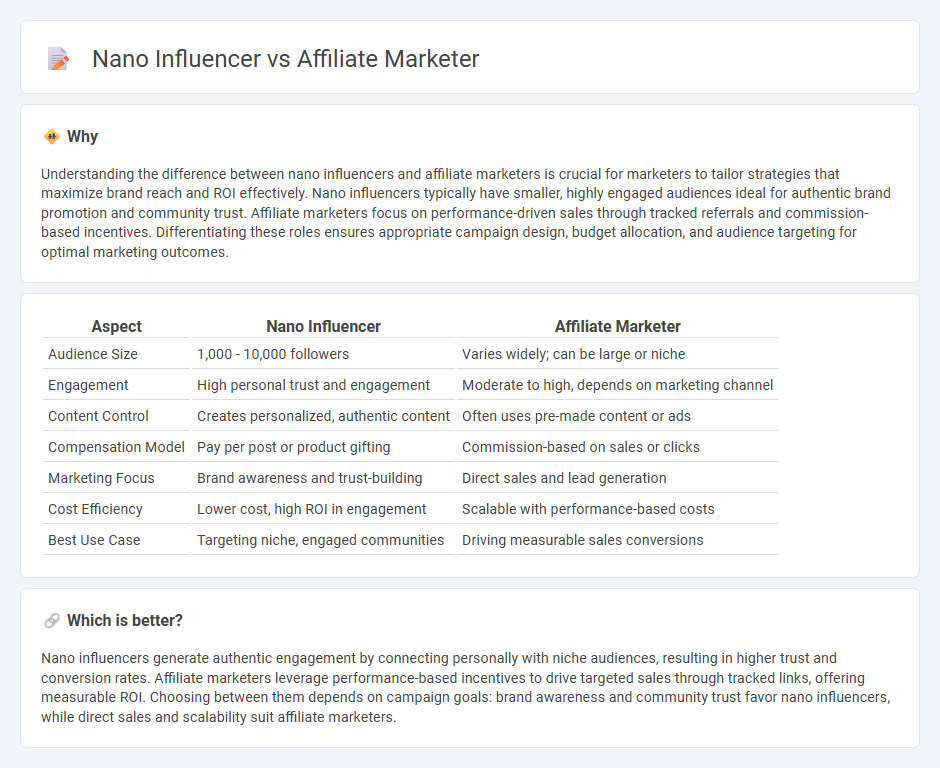
Nano influencers typically have smaller, highly engaged audiences ranging from 1,000 to 10,000 followers, allowing for authentic and personalized content that fosters trust. Affiliate marketers leverage performance-based partnerships to promote products or services across various channels, earning commissions through tracked sales or leads. Discover how integrating these strategies can amplify your marketing effectiveness.
Why it is important
Understanding the difference between nano influencers and affiliate marketers is crucial for marketers to tailor strategies that maximize brand reach and ROI effectively. Nano influencers typically have smaller, highly engaged audiences ideal for authentic brand promotion and community trust. Affiliate marketers focus on performance-driven sales through tracked referrals and commission-based incentives. Differentiating these roles ensures appropriate campaign design, budget allocation, and audience targeting for optimal marketing outcomes.
Comparison Table
| Aspect | Nano Influencer | Affiliate Marketer |
|---|---|---|
| Audience Size | 1,000 - 10,000 followers | Varies widely; can be large or niche |
| Engagement | High personal trust and engagement | Moderate to high, depends on marketing channel |
| Content Control | Creates personalized, authentic content | Often uses pre-made content or ads |
| Compensation Model | Pay per post or product gifting | Commission-based on sales or clicks |
| Marketing Focus | Brand awareness and trust-building | Direct sales and lead generation |
| Cost Efficiency | Lower cost, high ROI in engagement | Scalable with performance-based costs |
| Best Use Case | Targeting niche, engaged communities | Driving measurable sales conversions |
Which is better?
Nano influencers generate authentic engagement by connecting personally with niche audiences, resulting in higher trust and conversion rates. Affiliate marketers leverage performance-based incentives to drive targeted sales through tracked links, offering measurable ROI. Choosing between them depends on campaign goals: brand awareness and community trust favor nano influencers, while direct sales and scalability suit affiliate marketers.
Connection
Nano influencers boost affiliate marketing by leveraging their highly engaged, niche audiences to promote products authentically. Affiliate marketers utilize these partnerships to drive targeted traffic and increase conversion rates through personalized recommendations. This synergy enhances brand visibility and generates measurable sales growth in digital marketing campaigns.
Key Terms
Commission Structure
Affiliate marketers typically earn commissions based on direct sales generated through unique referral links, often receiving a percentage of the purchase value or a fixed fee per transaction. Nano influencers, with smaller but highly engaged audiences, may benefit from commission structures that include product giveaways, flat fees, or performance-based incentives tied to audience engagement or brand awareness. Explore detailed commission models and strategies to optimize earnings as either an affiliate marketer or a nano influencer.
Follower Reach
Affiliate marketers often leverage broad networks and extensive follower reach to maximize product promotion and sales, capitalizing on their ability to influence large audiences. Nano influencers, on the other hand, maintain smaller, highly engaged follower bases typically ranging from 1,000 to 10,000, offering more personalized and authentic engagement which can lead to higher conversion rates in niche markets. Explore the distinct advantages of follower reach in affiliate marketing and nano influence to optimize your digital strategy.
Content Authenticity
Affiliate marketers often prioritize strategic promotion and product link placements, while nano influencers emphasize genuine, relatable content that resonates with a smaller, highly engaged audience. Content authenticity drives trust and stronger emotional connections in nano influencers, which can lead to higher conversion rates despite their smaller following. Explore deeper insights into how content authenticity impacts marketing strategies between affiliate marketers and nano influencers.
Source and External Links
What Is Affiliate Marketing and How to Get Started - Affiliate marketing is a model where third-party affiliates promote merchants' products or services and earn commissions from sales or traffic generated, a key component in modern digital marketing.
Affiliate Marketing Guide: All You Need To Know (2025) - Affiliate marketing involves earning commissions by promoting company products via affiliate links, starting with picking a niche, choosing a platform, joining programs, creating content, and building an audience.
Amazon.com Associates Central - Amazon Associates is one of the largest affiliate programs allowing content creators to earn up to 10% commissions by sharing Amazon product links and qualifying purchases.
 dowidth.com
dowidth.com